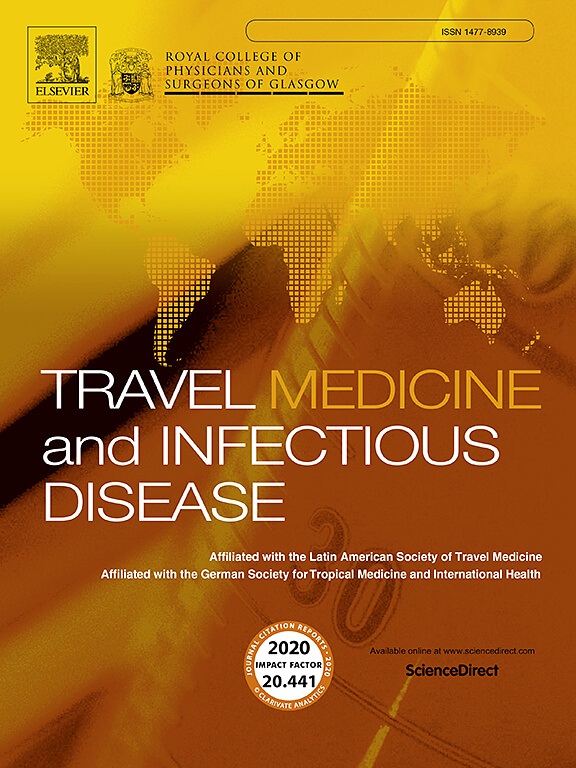这是一款针对美国国际旅行者的参与式监控手机应用。
IF 4.7
3区 医学
Q1 INFECTIOUS DISEASES
引用次数: 0
摘要
背景:全球旅行在传染病的传播中起着重要作用。现有的旅行监控程序收集旅行前后的数据,导致数据不完整和回忆偏差。我们开发了“旅行健康”移动应用程序,通过使美国旅行者能够报告每日症状调查,包括GIS位置,来解决这些差距。该应用程序为旅行者提供工具,包括疾病爆发通知、旅行钱包和疟疾药物提醒。方法:我们遵循以用户为中心的方法开发了《健康旅行》。我们在2023年7月至2024年8月期间通过在线平台和马萨诸塞州总医院的旅行者建议和免疫中心招募了研究参与者。我们分析了前50名参与者的人口统计、地理信息系统和自我报告的症状数据。数据从旅行前一天开始收集,到旅行后三天结束。我们进行了一次旅行后反馈调查。结果:参与者访问了亚洲、非洲、美洲和欧洲的204个地点。平均年龄33岁,66%为女性。最常见的旅行目的是休闲和/或商务,有46名(92%)受访者将这些列为旅行原因。总共输入了755份每日症状调查,其中105份报告了症状,对应于50名参与者中的29名(58%)。在有GIS数据的所有症状中,58%为上呼吸道症状,25%为胃肠道症状(集中在南亚),17%为其他症状。旅行后问卷调查显示,参与者发现该应用程序易于使用。结论:这项试点研究强调了参与式监测工具在补充传统的旅行相关疾病公共卫生监测方法方面的潜力。本文章由计算机程序翻译,如有差异,请以英文原文为准。
Travel Healthy, a mobile app for participatory surveillance among U.S. international travelers
Background
Global travel plays a role in the spread of infectious diseases. Existing travel surveillance programs collect data before and after trips, resulting in data incompleteness and recall bias. We developed the Travel Healthy mobile app to address these gaps, by enabling U.S. travelers to report daily symptom surveys including GPS location. The app offers traveler tools, including outbreak notices, a travel wallet, and a malaria medication reminder.
Methods
We developed Travel Healthy following a user-centric approach. We recruited study participants through an online platform and at the Travelers’ Advice and Immunization Center at Massachusetts General Hospital, between July 2023 and August 2024. We analyzed demographic, GPS, and self-reported symptom data from the first 50 participants. Data were collected starting one day before the trip and ending three days after. A post-travel feedback survey was performed.
Results
Participants visited 204 locations in Asia, Africa, the Americas, and Europe. Mean age was 33 years and 66 % were female. The most common purposes of travel were leisure and/or business, with 46 (92 %) of participants listing these as traveling reasons. A total of 755 daily symptom surveys were entered, with 105 reporting symptoms, corresponding to 29 of the 50 (58 %) participants. Among all symptoms with GPS data, 58 % were upper respiratory symptoms, 25 % were gastrointestinal (clustered in South Asia), and 17 % were other. Post-travel questionnaires showed that participants found the application easy to use.
Conclusion
This pilot study underscores the potential of participatory surveillance tools to complement traditional public health surveillance methods for travel-related illness.
求助全文
通过发布文献求助,成功后即可免费获取论文全文。
去求助
来源期刊

Travel Medicine and Infectious Disease
PUBLIC, ENVIRONMENTAL & OCCUPATIONAL HEALTH-INFECTIOUS DISEASES
CiteScore
19.40
自引率
1.70%
发文量
211
审稿时长
49 days
期刊介绍:
Travel Medicine and Infectious Disease
Publication Scope:
Publishes original papers, reviews, and consensus papers
Primary theme: infectious disease in the context of travel medicine
Focus Areas:
Epidemiology and surveillance of travel-related illness
Prevention and treatment of travel-associated infections
Malaria prevention and treatment
Travellers' diarrhoea
Infections associated with mass gatherings
Migration-related infections
Vaccines and vaccine-preventable disease
Global policy/regulations for disease prevention and control
Practical clinical issues for travel and tropical medicine practitioners
Coverage:
Addresses areas of controversy and debate in travel medicine
Aims to inform guidelines and policy pertinent to travel medicine and the prevention of infectious disease
Publication Features:
Offers a fast peer-review process
Provides early online publication of accepted manuscripts
Aims to publish cutting-edge papers
 求助内容:
求助内容: 应助结果提醒方式:
应助结果提醒方式:


